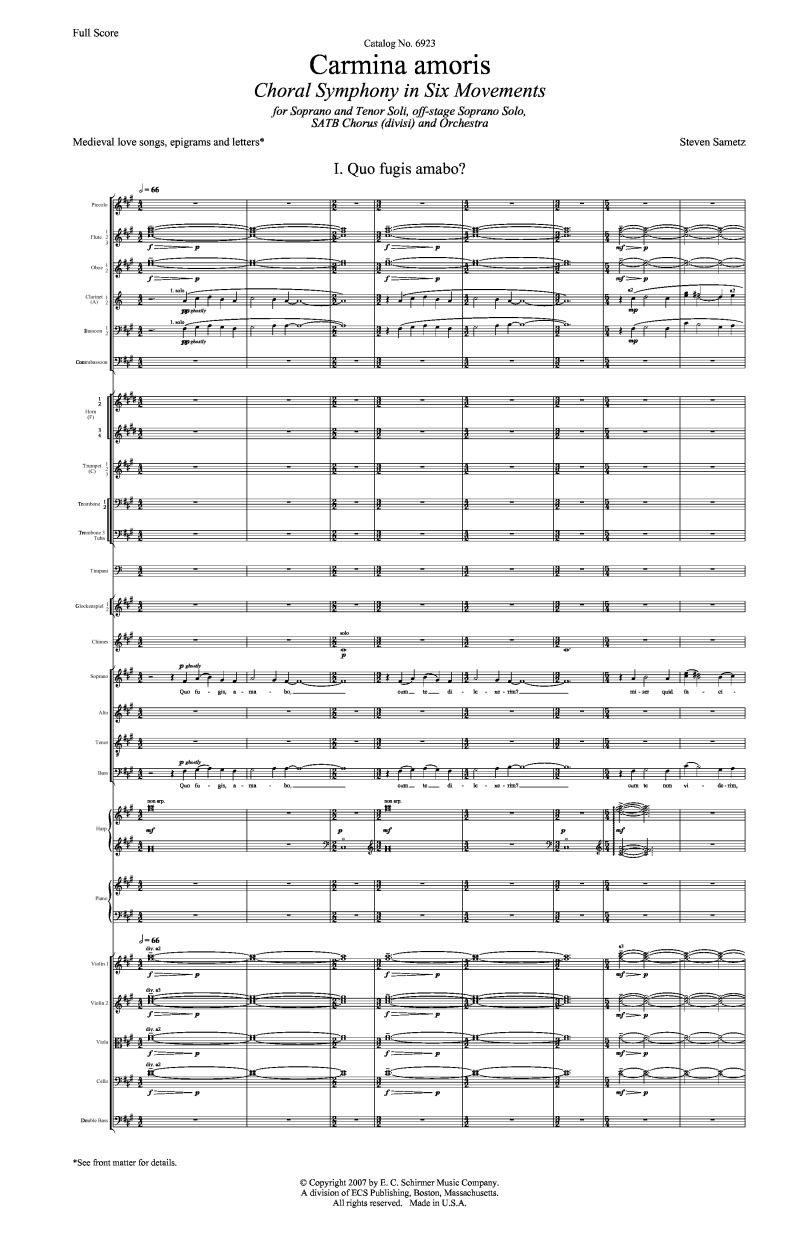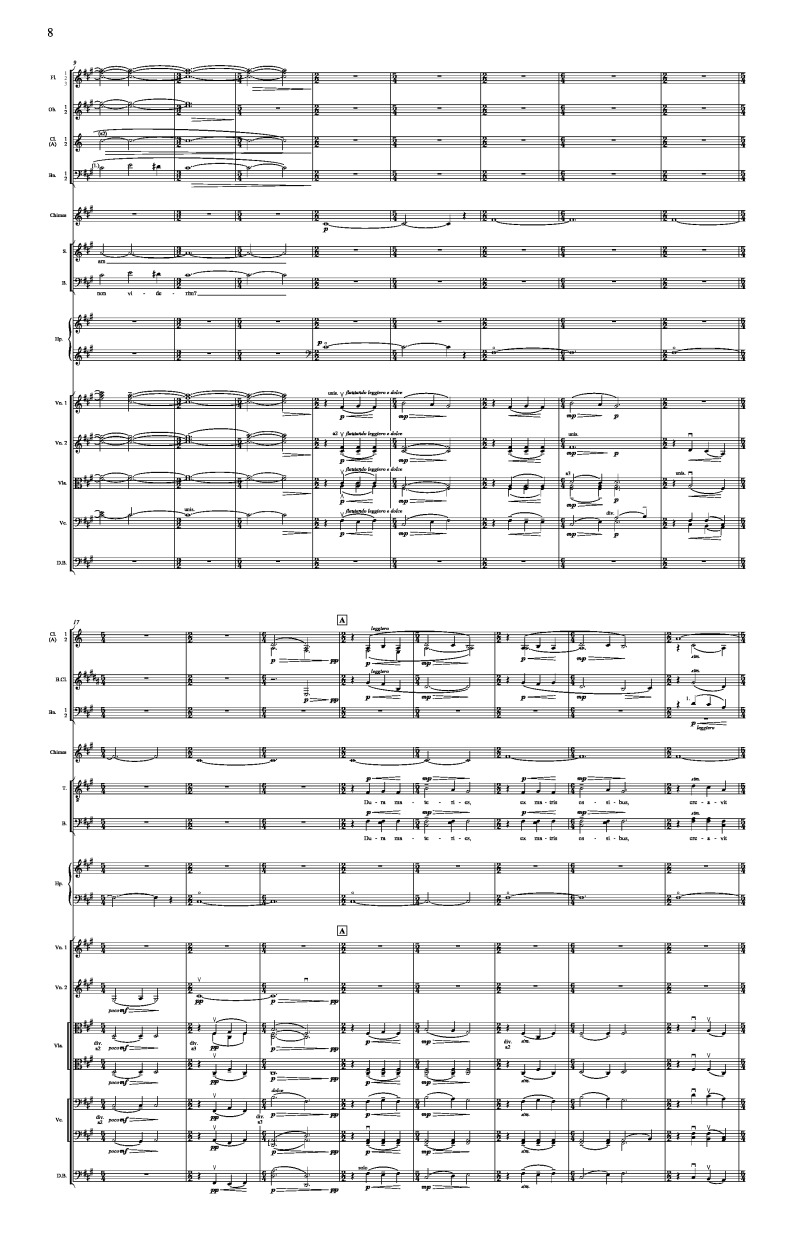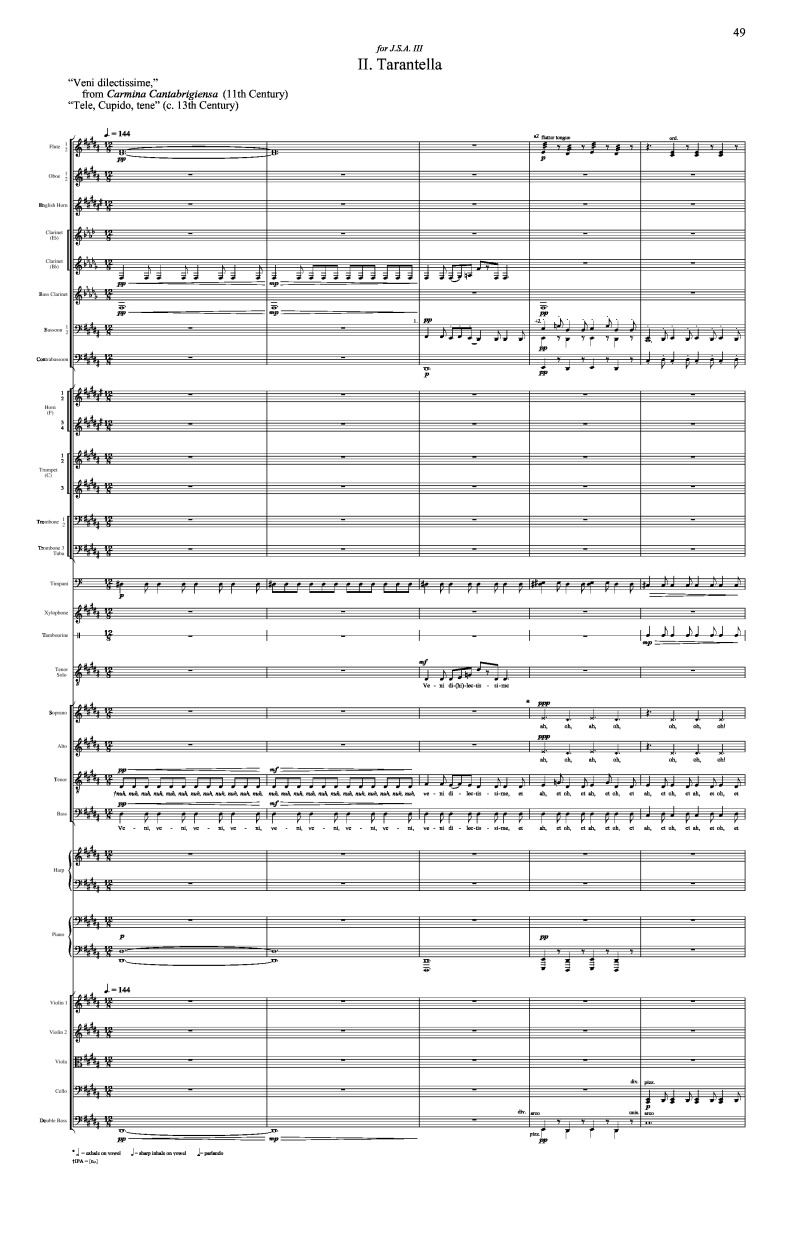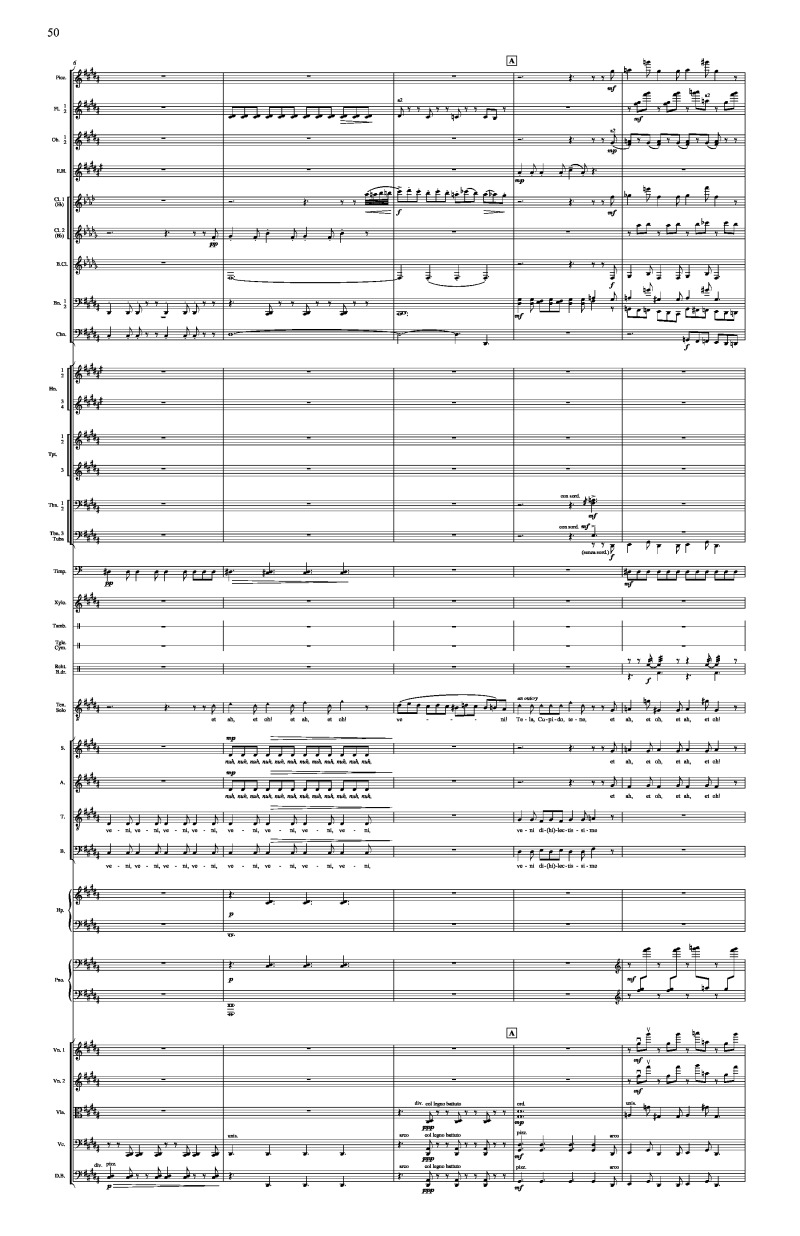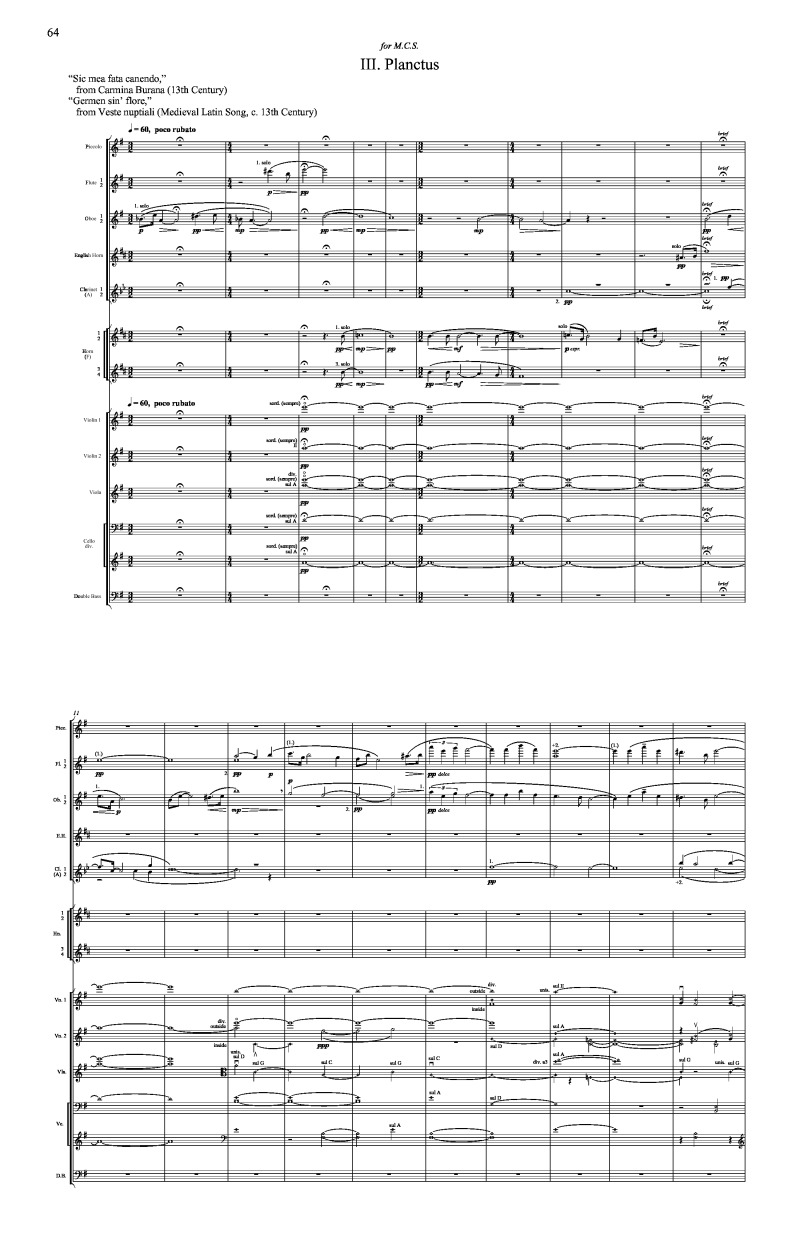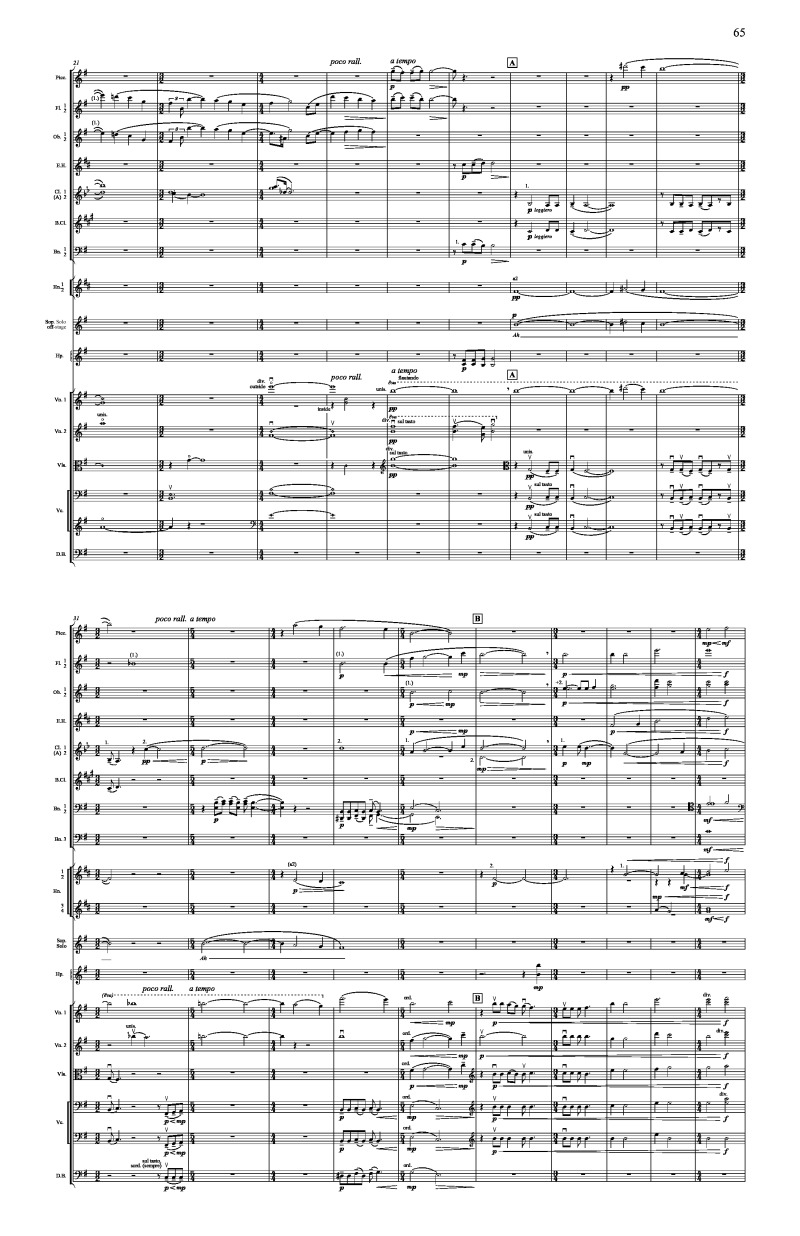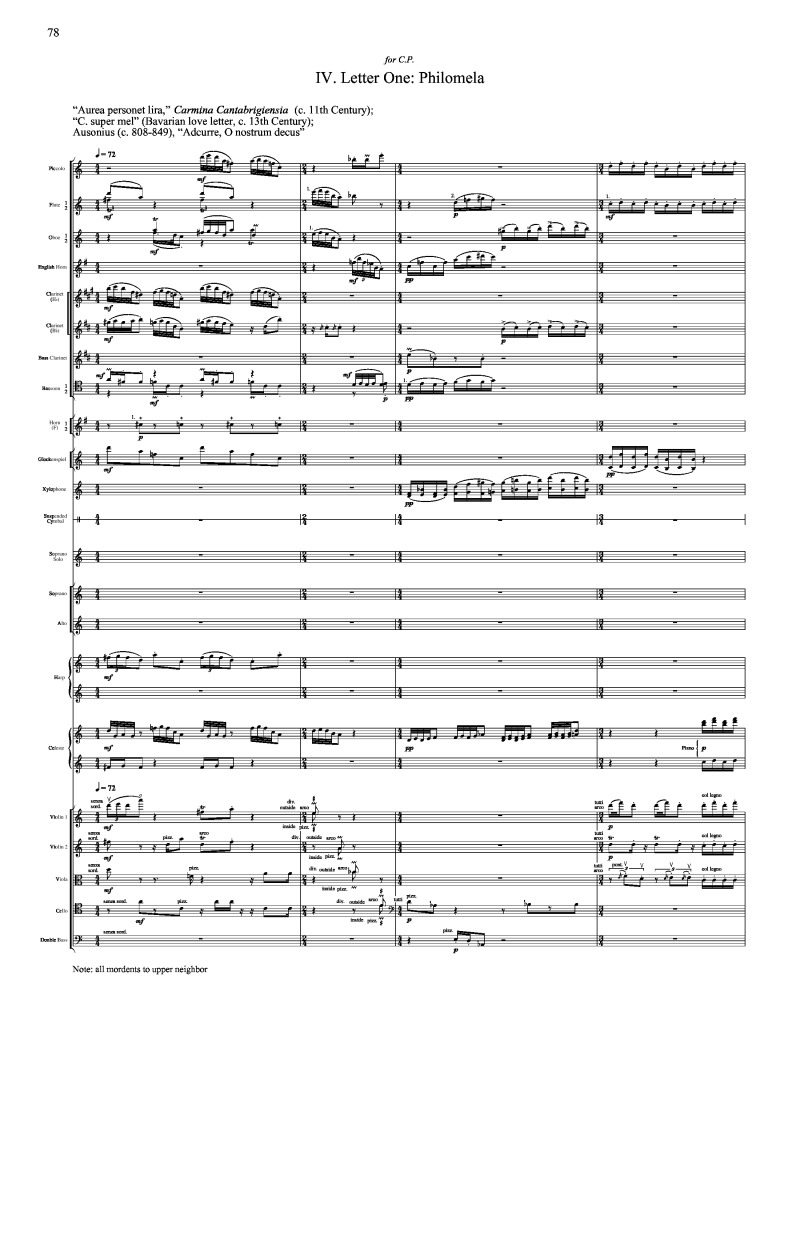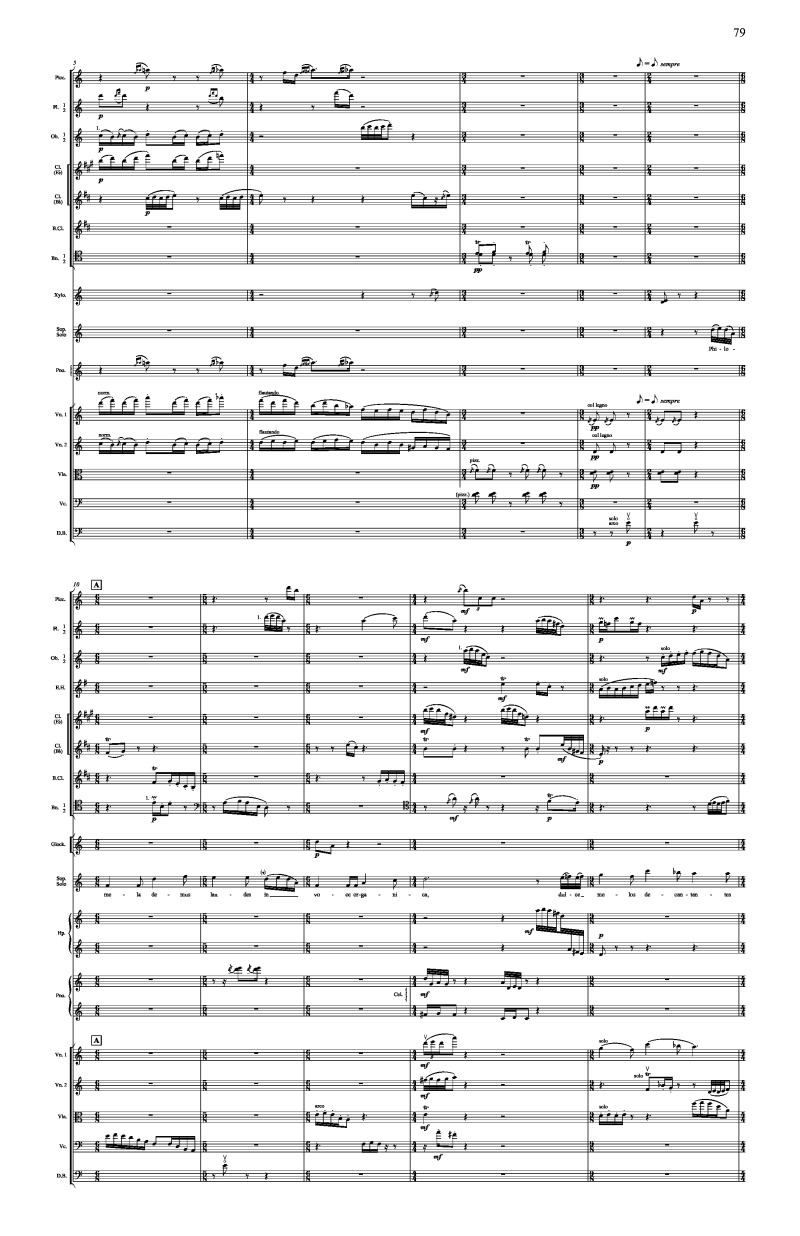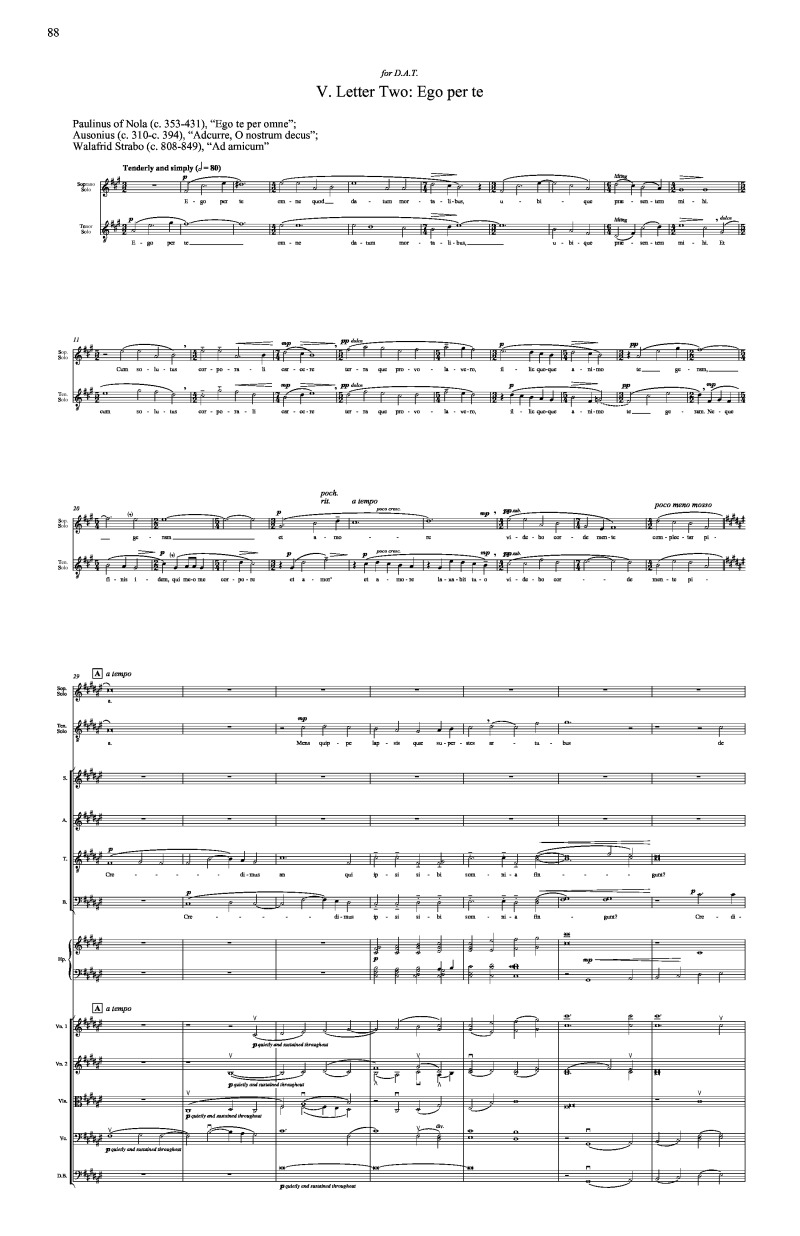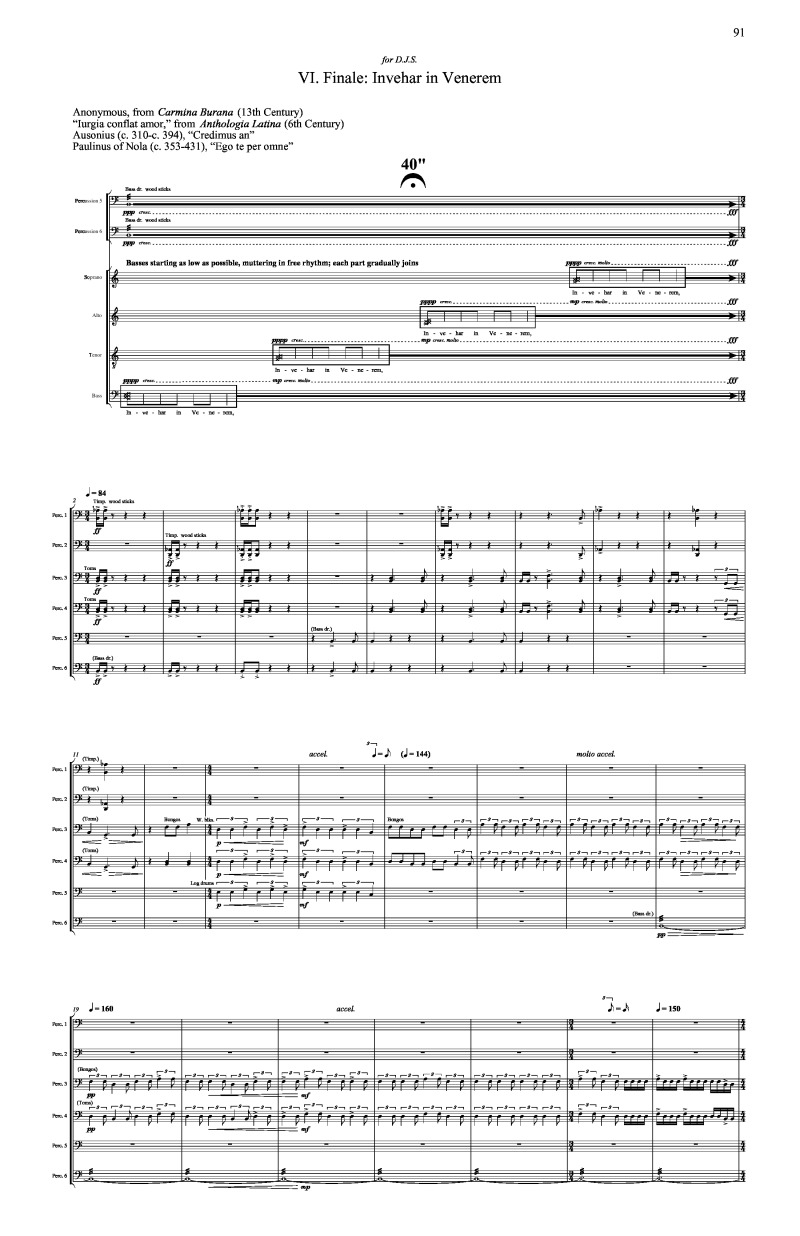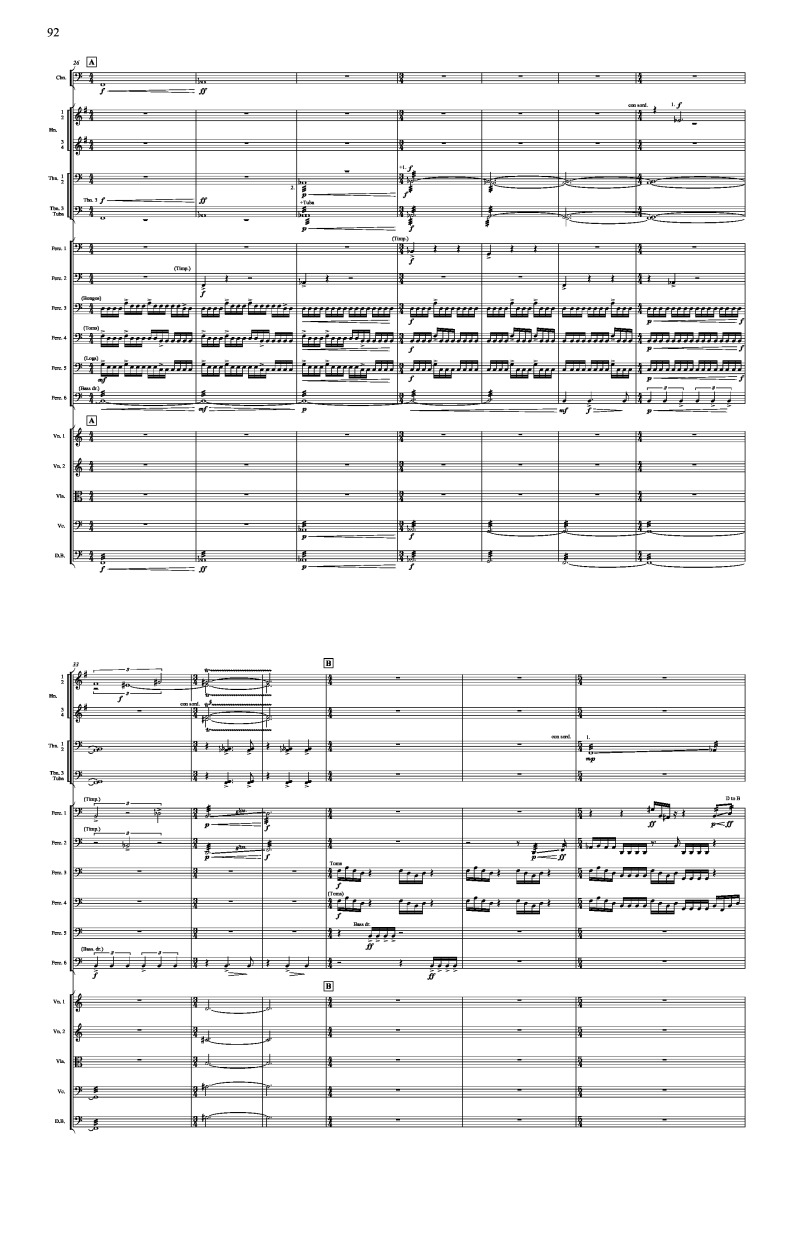-
Scoring
-
2 soprano solos (one off-stage), tenor solo; chorus and large orchestra (2 flutes, piccolo; 2 oboes, Eng. Hn.; 2 clarinets, Bs. Cl. (doubles 3d Cl.); 2 bassoons, contrabassoon (doubles 3d bssn.); 4 horns; 3 trumpets; 3 trombones; tuba; harp; piano/celeste; 6 percussion; strings)
-
Details
-
1:00:002001
Lehigh University Choral Arts
Steven Sametz, director
Carmen Pelton, soprano
John Aler, tenor
Debra Field, sopranoLehigh University Choral Arts
2001
Steven Sametz, director
Carmen Pelton, soprano
John Aler, tenor
Debra Field, sopranoChoral score ECS No. 7525
Piano-vocal score No. ECS 6925
Full score and orchestral material on rental -
Program Notes
-
Carmina amoris (Songs of Love)
Choral Symphony in six movements
I. Quo fugis, amabo? (circa 20 minutes)
Soprano and Tenor soloists and chorusII. Tarantella (circa 3 minutes)
Tenor soloist and chorusIII. Planctus (circa 14 minutes)
Off-stage soprano soloist and chamber choirIV. Letter One: Philomela (circa 5 minutes).
Soprano soloist and chorusV. Letter Two: Ego per te (circa 5 minutes)
Soprano and Tenor soloists and chorusVI. Finale: Invehar in Venerem (circa 9 minutes)
Soprano and Tenor soloists and chorus“Do those who love create dreams for themselves?”
When I first began to look at medieval Latin texts for Carmina amoris, the epigrams, marginalia, and love letters I found by clerics and nuns from the fourth to the thirteenth centuries were a revelation. The beauty and freshness of the language spoke across the centuries. In matters of love (longing, desire, lamenting, sleepless wondering, making up and quarreling), it appears not much has changed from the so-called “dark ages” to our own well-illumined era.
The medieval texts inspired the chant-like motive for the opening “Quo fugis amabo?”. Developed throughout the first movement (depicting the gentle lapping of waves on the shore, the lovers’ longing across the sea), the chant motive recurs throughout the symphony, finally transformed into a fantasia in the last movement. Also introduced in the first movement is Ausonius’s fourth -century text: “But do we believe that those who love create dreams for themselves?”. As the question runs throughout Carmina amoris, the implied answer is shaped by the context of each movement. At the end of the first movement, this question is left unanswered. The restless youth (the tenor soloist) is left longing for his love across the moonlit sea. It is his distant love – or merely the moonlight – answering: “let this light be a pledge of our love.”
Any peace is shattered by the “Tarantella.” Tarantellas are traditionally dances of mad frenzy, and here the tenor protagonist is thrown into a state of adolescent tumult and desire. This gives way to the third movement, “Planctus,” a largely wordless lament cast for chamber choir and off-stage soprano. The distant sound of the soprano lends poignancy to the idea that one who is without love is like a voice without sound.
Two clerical love letters form the texts of the fourth and fifth movements. The fourth movement is filled with birdsongs. The nightingale – a medieval trope on the Greek legend of Philomela – intends to give peace to the sleeper. Instead, the sleepless lover says she is a hungry bird, sighing for love. In this nocturnal setting, the chorus recalls Ausonius’s motto: lovers live in their own dreams.
The fifth movement begins as an unaccompanied love duet for the tenor and soprano soloists. This yields to a choral statement of Ausonius’s words, now treated as a chorale, a genre used for centuries for statements of belief. Thus, the musical and textual question left hanging at the end of the first movement finds its resolution at the end of the fifth movement. The question “Credimus?” (“Do we believe?”) is supplanted by its answer “Credimus” (“We believe”) as the chorus provides the restful tonic chord withheld at the end of the first movement.
All does not end on a quiet note of contemplation. The restless seeking, desire, lamentation, sleeplessness, and measure of happiness found by the lovers erupts into a tempestuous quarrel (aided by a large percussion ensemble inspired by the fiercely rhythmic Koto drumming of Japan). Ausonius’s motto appears during a brief interlude, as if to ask whether quarreling is yet another facet of love’s dream. The opening chant transforms into a tongue-twisting rhythmic melody for the chorus. The orchestra hurls it about and the music ends in a final explosion of sound, but not before a final whisper of the “Credimus” motive is sounded by a solo oboe.
-
Text / translation
-
I. Quo fugis amabo?
Chorus
Quo fugis, amabo, cum te dilexerim?Miser quid faciam cum te non viderim?
Dura materies ex matris ossibus
creavit homines iactis lapidibus,
ex quibus unus est iste puerulus,
qui lacrimabiles no curat gemitus.
Cum tristis fuero gaudebit emulus
ut cerua rugio cum fugit hinnulus.
Arcos te protegat, Veneris idolum
qui stellas et polum
fecit maria condidit et solumTenor solo
Nam languens amore tuo
consurrexi diluculo
perrexi que pedes nuda
per nives et frigora
atque maria rimabar mesta
ai forte ventiuola vela cenerem
aut frontem navis conspicerem.Tenor and Chorus
Credimus an,
qui amant ipsi sibi somnia fingunt?Chorus
Saluto puerum non per ipotesim
sed firmo pectore, deprecor Lachesim.Soprano
Cum splendor lunae fulgescat
ab aethere purae,
tu sta sub divo cernens
speculamine miro,
qualiter ex luna splendescat
lampade pura
et splendore suo caros
amplectitur uno,
corpore divisos
sed mentis amore legatos.Chorus
Si facies faciem spectare
Nequivit amantem,
hoc saltim nobis lumen
sit pignus amoris
Hos tibi versiculos
Fidus transimisit amicus.Quo fugis amabo…?
Tenor
Nam languens….Tenor and Chorus
Arcos te protegat…Chorus
Si facies faciem…
Si parte tua fidei stat fixa catena,
Nunc precor, ut valeas
Felix per saecula cunctaSoprano
Cum splendor lunae fulgescat….Tenor
Nam languens…Chorus
Credimus an…Hos tibi versiculos
Fidus transimisit amicus.Soprano
Amore ligatos…Tenor
Quo fugis amabo…?Chorus
Credimus?II. Tarantella (Veni, dilectissime)
Tenor and ChorusVeni, dilectissime,
Et a et o,Tela, Cupido tene,
Quoniam non ille nec illa
Sustinet esse meus, vel mea.Veni!
Tela, Cupido tene!Et a et o,
Quid amo? Quod amat.
Non absit. At huius
Quod fugit, huius ero?Non ero.
Tela tene, tela tene!
Gratam me in visere
In languore pereo
Venerem desideroVeni, dilectissime,
Tela, Cupido, tene!Quia non teneo quod amo tenuisse.
An dixi quod amo? Non amo!Et a et o,
Veni!
III. Planctus (Lament)
Off-stage Soprano and chamber chorus
Sic mea fata canendo solor
ut nece proxima facit holor.
Roseus effugit ore color
blandus inest meo cordi dolor.
Cura crescente, labor vigente,
vigore labente, miser, morior
tam male pectora multat amor.
Heu, morior, heu morior
ut quod amorem
cogor et non amor.Chorale
Germen sine flore
framis sine dulcore
vas sine liquore
vox est sine stentore.IV. Letter One: Philomele (To Philomela)
Soprano solo
Philomele demus laudes
in voce organica,
dulce melos decantantes
sicut docet musica.
Hilarescit Philomela
dulcis vocis conscia
et extendens modulando
gutteris spiramina
Instat nocti et diei
voce sub dulcisona
soporatis dans quietem.Cur tamdiu in longinquo moraris?
Cur unicam tuam perere vis,
que anima et corpore diligit, ut ipsa scis?
et que more avicule esurientis
te suspirat omnibus horis atque momentis.Chorus
Credimus an, qui amant ipsi sibi somnia fingunt?V. Letter Two: Ego per te (I For You)
Soprano and tenor
Ego per te
omne quod datum mortalibus,
ubique praesentem mihi.
Et cum corporali carcere
terraque provolavero,
illic quoque animo te geram.
Neque finis idem, qui meo corpore
et amore laxabit tuo;
videbo corde
mente complectar pia.
Mens quippe,
lapsis quae superstes artubus
de stirpe durat caeliti,
Ego per te…
et ut mori, sic oblivisci non capit.
Ego per te…
Perenne vivax et memor.
Ego per te…Chorus
Credimus an,
qui amant ipsi sibi somnia fingunt?
Hos tibi versiculos
Fidus transimisit amicus.Credimus.
VI. Invehar in Venerem (Venus be Damned!)
Chorus
Invehar in Venerem!Iurgia conflat amor
Ut blandius urat amantes:
Ad cumulum fidei
Iurgia conflat amor.Soprano, Tenor, and Chorus
Credimus an,
qui amant ipsi sibi somnia fingunt?Invehar in Venerem
et dediscat veterem
malignandi spiritum!
Cur amo, si non amor?
Satius est, ut amor
in odium vertatur.
Sed absit quod amantium
remedium sit odium
quod initum per gaudium
consorcium divorcium
sorciatur.In odium converti
nec ius amoris certi
nec finis est probandus.
Amorem enim odio,
Si finio, si vitio
per vitium subvenio.
Desipio, si studio
Sanitatis insanio
Non sanandus.Translation
I. Quo fugis amabo? (Where do you flee?)
Chorus
Where do you flee, I would like to know, since I loved you?
Miserable now, what shall I do since I cannot see you?
Hard matter from mother earth’s bones
once created men when stones were thrown.
One sprung from these is this young boy
who heeds not my tearful moans.
When I am sad my rival rejoices.
I cry out like the doe when her fawn flees.
May the Almighty protect you, idol of Venus,
He who made the stars and sky
and founded the seas and land.Tenor solo
Languishing for love of you
I arose at dawn
and made my way bare-footed
across the snows and cold,
and searched the desolate seas
to see if I could find sails flying in the wind,
or catch sight of the prow of a ship.Tenor and Chorus
Do we believe this or do those who love create dreams for themselves?Chorus
I wish you well, boy, not with feigned concern
but with steadfast heart, I pray to Lachesis.Soprano
When the splendor of the unclouded moon
shines from the sky,
stand under the heavens and see with
a wondering gaze
how the moon shines
like a clear torch
and how with its single splendor
it embraces loved ones
divided in body
but joined in spirit by love.Chorus
If face cannot gaze
on loving face,
at least let this light
be our pledge of love.
These little verses
are sent to you by a faithful friend.Where do you flee…?
Tenor
I languish…
Tenor and Chorus
God protect you….
Chorus
If face cannot gaze on loving face…
If on your side the bond of faith stands firm,
now I bid you farewell.
Be happy forever.Soprano
When splendor of the unclouded moon….Tenor
I languish….Chorus
Do we believe…?These little verses
are sent to you by a faithful friend.Soprano
We are bound in loveTenor
Where do you flee?Chorus
Do we believe?II. Tarantella (Veni, dilectissime) (Come, dearest love)
Tenor and Chorus
Come, dearest love,
with ah! and oh!Hold your arrows, Cupid,
for neither he nor she
continues to be mine.Come!
Hold your arrows, Cupid,with ah! and oh!
What do I love? One who loves.
May he not stay away.
But will I belong to one who flees from me?I will not.
Hold your arrows, hold your arrows!To visit me – I will please you
I am dying with desire.
How I long for loveCome, dearest love,
Hold your arrows, Cupid!For I don’t keep the one I’d love to have possessed
But did I say “the one I love?” I don’t love!with ah! and oh!
Come!
III. Planctus (Lament)
Off-stage Soprano and chamber chorus
Thus I sing to assuage my fate
Like the swan as death approaches.
The rose color fades from my lips,
The sweet pain in my heart is made apparent.
With cares growing, labor more pressing,
strength waning, wretched I die.
So cruelly love punishes human hearts.
Ah, I am dying, dying
for I love
and am not loved.Chorale
A stem without a bud,
repast without sweetness,
a bottle without wine,
such is the voice with no sound.IV. Letter One: Philomele (To Philomela)
Soprano solo
Let us give praise to the nightingale
with well-tuned voice,
singing out a sweet melody
as music teaches.
The nightingale is joyful
aware of her sweet voice,
and prolonging the breathing
of her sweet voice,
she presses on night and day
with her sweet-sounding voice
Giving peace to sleepers.
Why do you want me to die
Your one and only who loves youAs you know yourself, with her soul and body
And who like a hungry bird
Sighs for you at every hour and moment?Do we believe this,
Or do those who love create dreams for themselves?V. Letter Two: Ego per the (I for you)
Soprano and tenor
I for you
for all time which is given to mortals
You will be with me everywhere.
And when released from this bodily prison
I fly from earth
There, too, I will keep you in my spirit.
Nor will the end which frees me from my body
release me from your love;
I will see you in my heart
and with a loving spirit embrace you.
For the mind,
once it has survived the loss of limbs,
continues to grow out of its heavenly root,
I for you…
And just as it experiences no death
I for you…
It will experience no loss of memory.
I for you…Chorus
Do we believe this,
Or do those who love create dreams for themselves?These little verses
Are sent to you by a faithful friend.
We believe.VI. Invehar in Venerem (Venus be Damned!)
Chorus
Venus be damned!Love kindles quarrels
so it can burn lovers more seductively:
To crown their faithfulness
Love kindles quarrels.Soprano, Tenor, and Chorus
Do we believe this,
Or do those who love create dreams for themselves?Venus be damned
and forsake her old
malicious spirit!
Why should I love, if I am not loved?
Better that love
be turned to hate.
Banish that odious
remedy of lovers—
a happy union severed,
cast by lot to divorce.To turn to hate
bucks the law of love:
it’s a dead end.
If I end love with hate,
I help vice’s viciousness.
Through I risk my sanity
in devotion to love,
saner may I be, should
I be healed through love’s insanities.
